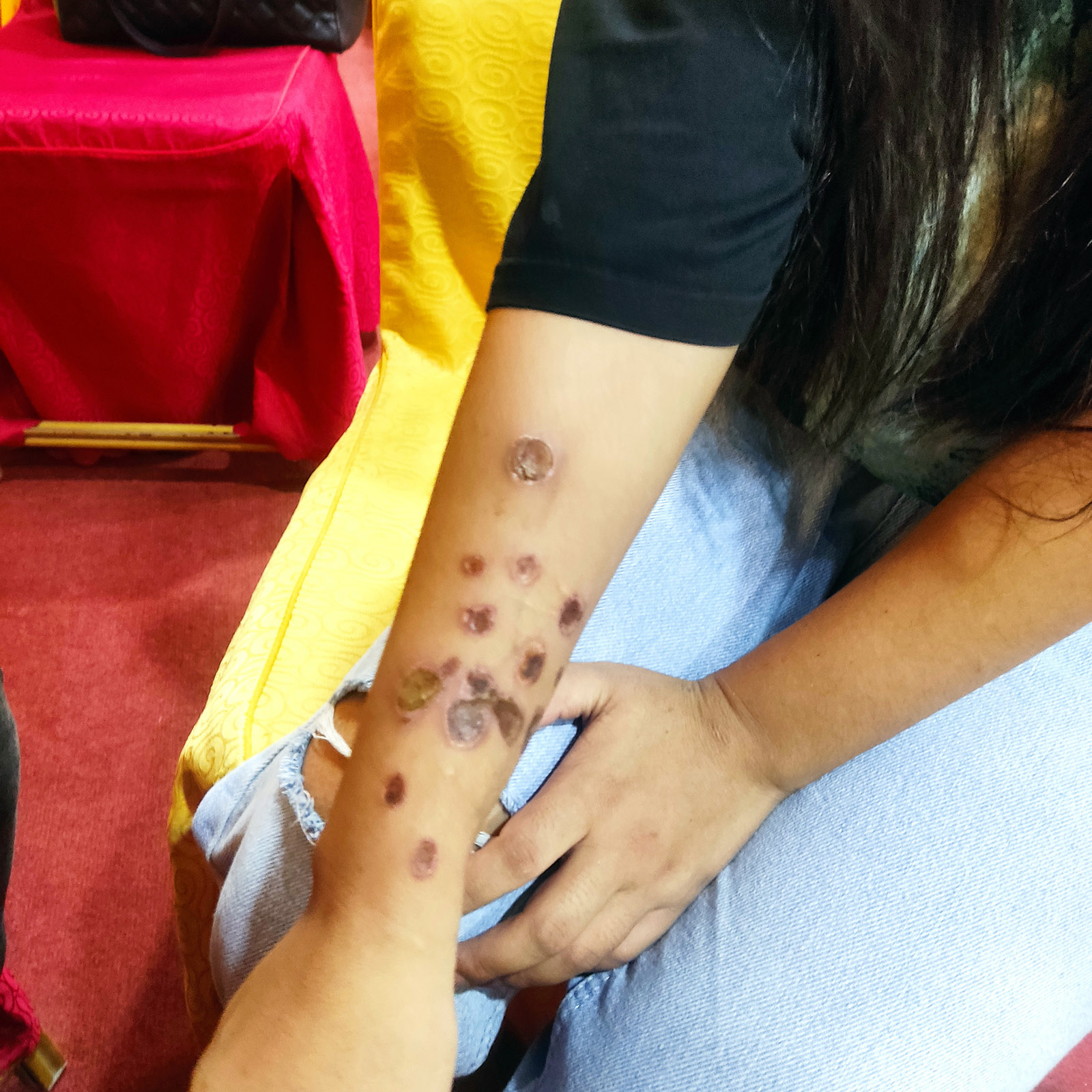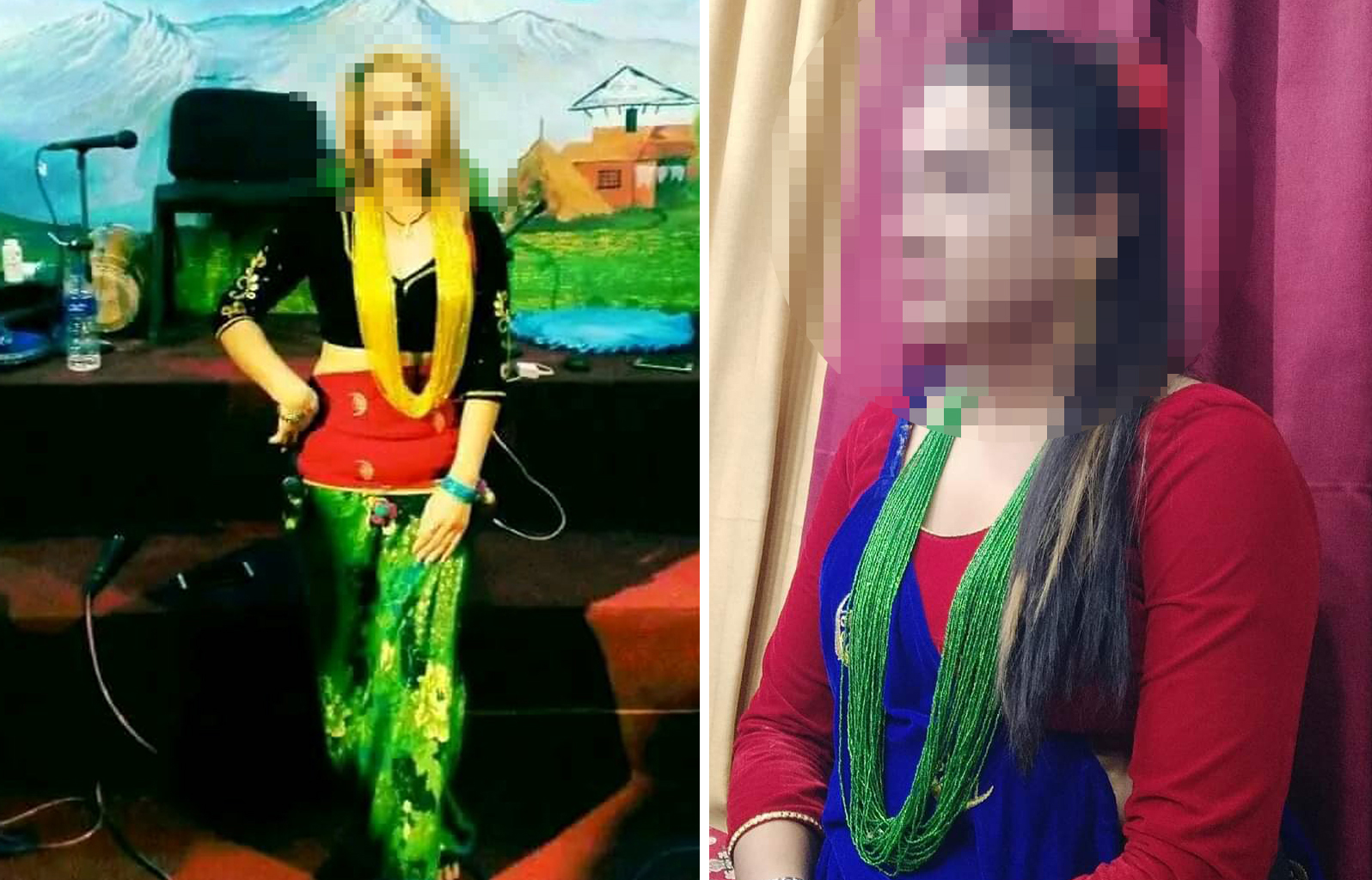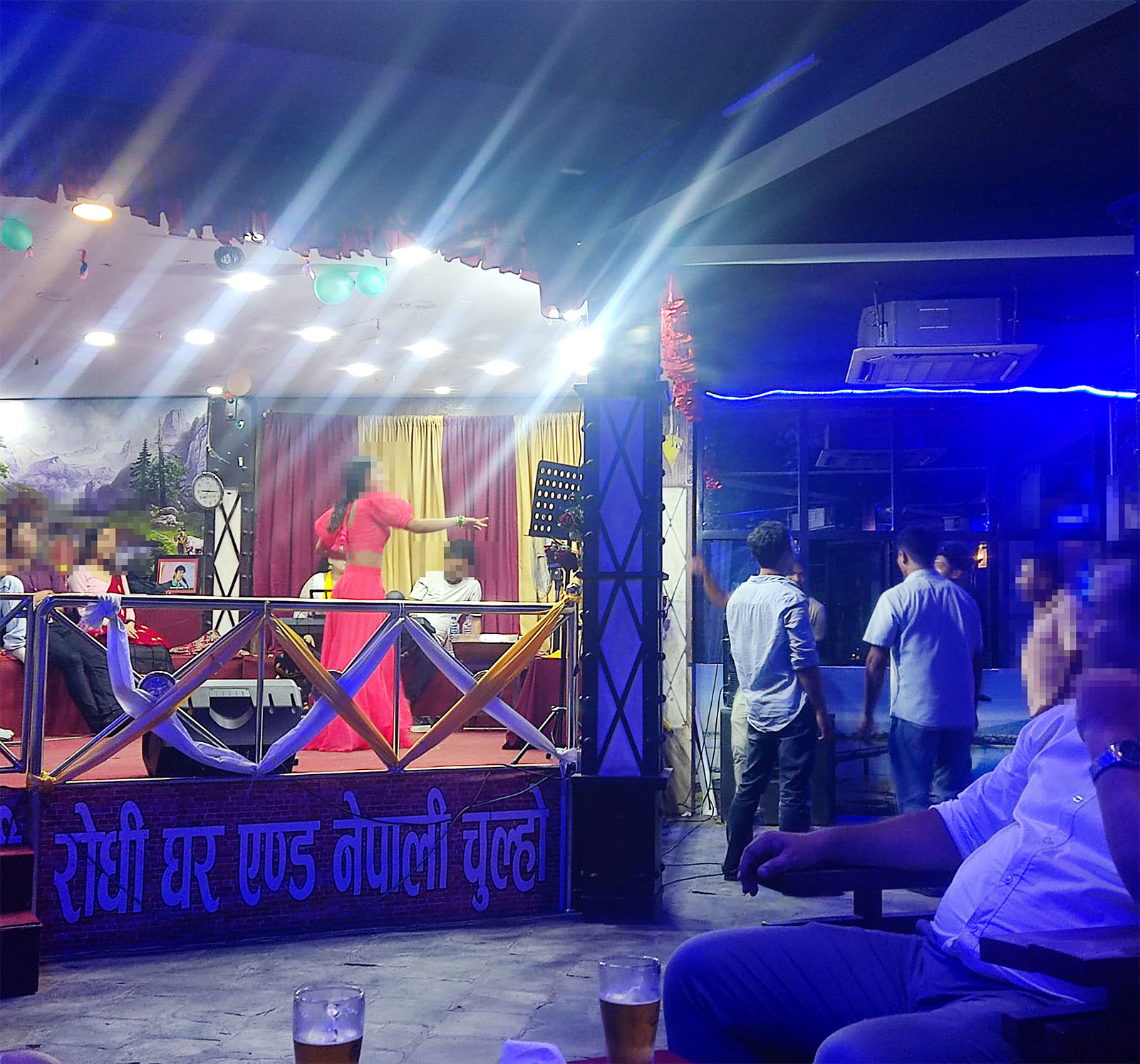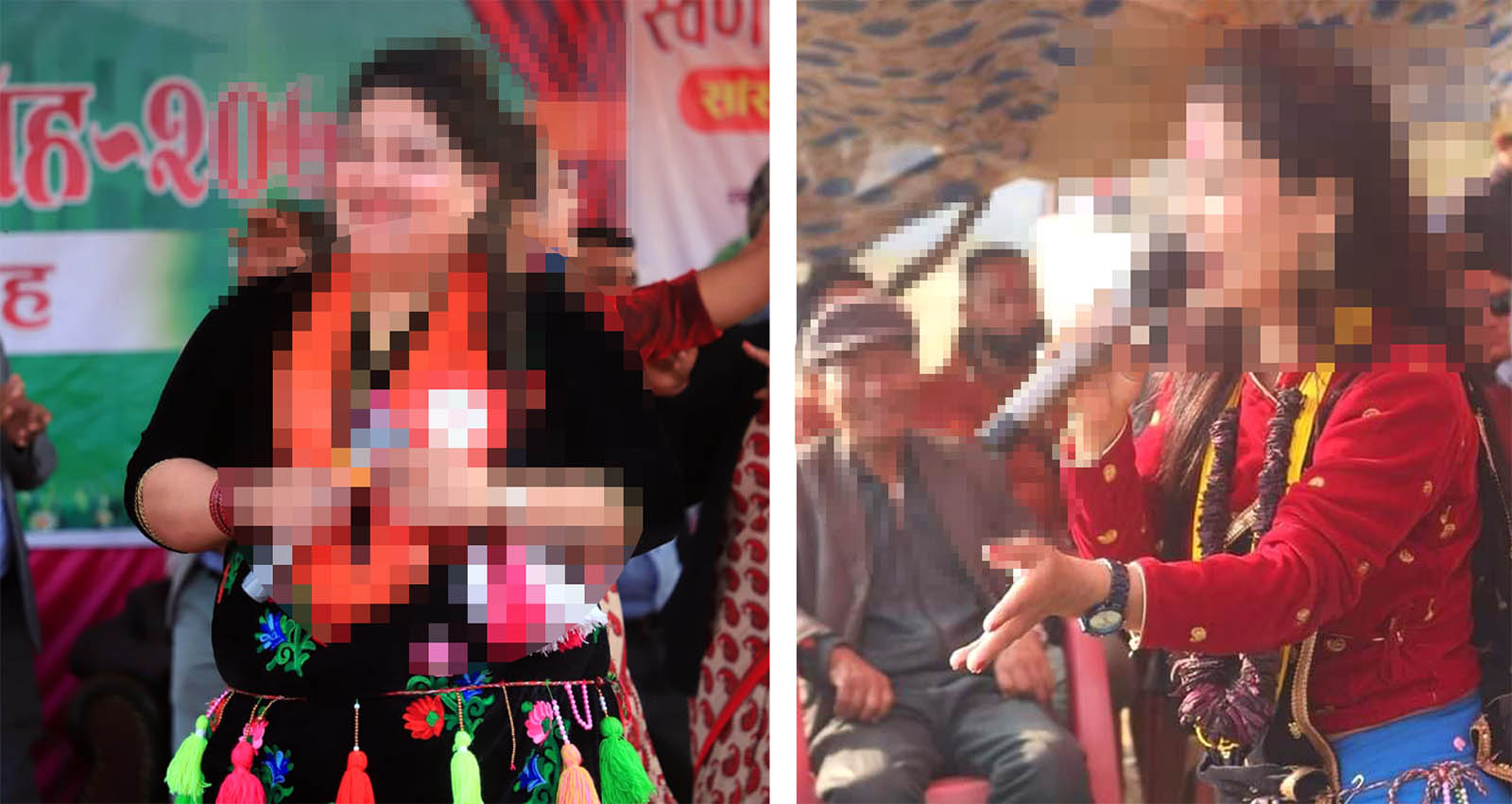Most women and girls who end up at dohori saajh and cottage restaurants essentially want to escape poverty and violence. However, they are further pushed into exploitation by the unsavoury motives of owners and managers, along with the ignorance of law enforcement. Many children are trafficked in this manner.
Pratima Silwal and Sindhu Dhakal | CIJ Nepal
A half-naked 15-year-old girl was found at Unique Cottage at Bharatpur-7, Chitwan. With the information that girls are sexually abused at the restaurant, police conducted a raid on Chait 2, 2079. The man who violated the girl had already run away. Police took her into its protection and arrested the restaurant manager. The parents of the girl who went to the police station to find their daughter were shaken after discovering that she was forced into sex work.
Bharatpur 63, a pseudonym given by the police, left her studies at class 8, while her poverty-ridden parents could not let her continue her education. After that, she started working at a clothing store at Narayangarh. During this period, her conversation with a woman she met on Facebook became frequent. In the final week of Falgun 2079, the woman called the girl for lunch at the Unique Cottage restaurant at Bharatpur-7. The restaurant owner then started to lure her into sex work.
Bharatpur 63 does not even know the actual name of the woman, who called herself ‘Jhumri’ on Facebook. According to the girl’s statement to the police, she used to go to the restaurant after lying to her parents that she was going to a clothing store for work. The restaurant made her sleep with up to 5 customers in a day. The girl bought new clothes every week, carried an expensive mobile phone, and lied to the parents that she would be at a friend’s birthday when she reached home late in the night.
In the statement given by the girl in the case presented to the Chitwan District Court on 13 Baisakh, 2080, she explained, “When I first went to the restaurant for lunch, the owner – Maya Pariyar asked for my phone number. After that, she used to call me when customers came there. This kept on happening and I had to sleep with even 5 men. Out of Rs 5,000 paid by each customer to the restaurant, I got only Rs 1,000.”

The police saved Bharatpur 63 from additional violence and trafficking. However, there is no record of the daily ordeals faced by 19-year-old Syangja (changed name). Her soldiers are full of wounds from cigarettes, some new and some with old blood clots. She cannot return to her family. Although she is married, her husband is not with her. Being a mother, she cannot show love and care for her child. Originally from Lamjung, she eloped with a man at the age of 15 and gave birth to a son at 16. After that, her relationship with her husband turned sour and she was forced to leave his house. Unable to bear the social stigma of having left the husband, she went to Chitwan to earn her living.
With a good singing voice, she got a job at a dohori sajh restaurant in Chitwan, where she became a popular singer. After entering the restaurant with a salary of Rs 7 thousand per month, she developed a habit of consuming alcohol and cigarettes. As she did not want to open up about the violence she has been facing, she said, “When I become stressed, I burn my body with cigarettes.”
According to the Chitwan District Police Office, 15 women and children including 6 girls below the age of 18, were rescued from Chiwan’s ‘market’ during the the fiscal year 2077-78 until 2079-80
Out of the Frying Pan into the Fire
Gorkha (changed name) is a woman who has started working at another restaurant after the previous dohori restaurant did not pay her. She is in this sector since 2077 not without painful experiences. She was leading her life in Gorkha with subsistence farming, while her parents wanted to find a good husband for her. At the young age of 14, she was married to a man with land and property. However, her marriage then turned her life into a nightmare as the husband used to beat her aggressively, wounding her body and soul mercilessly.
“I used to come back home after working in the land but he suspected me of spending time with another man and beat me up by gagging me with a sawl,” said now 28-year-old Gorkha. To escape the violence, she went to a dohori restaurant in 2077. But she is now facing a greater nightmare – uterine cancer.
Dohori sajh restaurants do not just serve dohori songs. When customers call the singers, they are forced to go to the tables, eat and flirt with the customers and make them satisfied. “Customers come to the stage to pull me. I try not to go with them by telling them I am not feeling well,” said Gorkha.

27 years old Pyuthan (changed name) is forced to tolerate a similar kind of violence. In 2072, she came to Chitwan from Pyuthan, where she had studied till class 8. Her mother was accused of being a witch, her father was attacked by cancer and her family was drowned in debt. This situation pushed her to the world of dohori.
Facebook Messenger was just seeing the start of online dohori competitions. She downloaded Messenger and connected with a dohori group. After listening to her songs, a dohori restaurant in Chitwan offered her a job. She then sang during the nights and worked as a waiter during the afternoons. Her family had taken a loan of Rs 4 lakhs for her father’s treatment. To pay back the debt, she collected her salary and tips and started sending Rs 30-40 thousand to her family. However, after the owner sold the restaurant, she did not receive her salary. When she asked for her money, the owner indicated that he needed sex from her.
Now, as she works in another restaurant at Bharatpur, the behaviour of customers remains the same. “Gradually with the effect of alcohol, they come near us, look at us and start caressing their organ. They ask us to go with them for money. Now, it has become a habit to see such customers at the restaurant.”
They do not come to the judicial process
The Public Attorney’s Office filed a case at the court against the owners of the dohori restaurant, Chandra Bahadur Pariyar and his wife, who forced Bharatpur 63 to do sex work. But the survivor and her father both changed their statement at the court. The girl even said at the court that she had not gone to the restaurant at all. The Chitwan District Court then absolved the couple of crimes on Baisakh 24 based on the girl’s altered statement.
Most women and girls exploited at hotels and restaurants do not get involved in the judicial process at all. Spokesperson of the Chitwan District Police Office, DSP Bijay Raj Pandit explained that they are exploited as they have faced violence and poverty in the past. As their life after being rescued is not secure yet, they do not make any official complaints. Those who do make the complaint can turn hostile later. Pandit said, “Human trafficking is on the rise, especially in Chitwan.” Two girls in Chitwan also changed their statement at the court in favour of the hotel manager who forced them into sex work instead of the previously promised job of waitress.

Originally from Chitwan and a mother of two daughters, Chhetrapur Ka (changed name), married a man from Syangja. After living in Syangja for some time, she came to Chitwan and became a street vendor. She already had two children from her husband’s previous marriage but the husband is not reliable because of his alcoholism. As her income alone is not sufficient to take care of four children, her daughters could not go to school.
On Chait 1, police interrogated these two young girls who were walking on the bank of Narayani River near the police station at 9 pm in the night. It was discovered that they were also trafficked without their knowledge. The 15 and 16-year-old girls were forced into sex work by their aunty, Dhaulagiri Ka (changed name) and a hotel manager. According to the police, they were kept at a hotel since Falgun 26 and were forced to have sex with 3 to 4 customers per day. The girls were given Rs 500 for each customer, while the aunty and the hotel manager kept the rest of the money. Although a case was registered at the court against the aunty and the hotel manager after the police investigation, the girls changed their statement in favour of the accused. Following this, both the accused were acquitted by the court on Asar 25.
As a manager of a temporary safe house for girls who faced sexual violence and trafficking, Manju Khand said, “When these girls with cases in the court go back to their families, their statements instantly change.” According to Khand, parents of such girls deliberately take them to their homes to make their daughters hostile towards their first statement at the court. As the perpetrators influence the parents, the girls then do not get justice.
Inspector Sarita Biswakarma representing the Women, Children and Senior Citizens Department of Chitwan Police said that it is difficult to bring incidents of trafficking, sexual violence and exploitation at hotels and restaurants to the police. She said, “First of all, they do not want to be exposed. The victims are afraid that they might be questioned as they work at hotels during the night.”

Studies have shown that there is a high number of incidents of violence against women who work in the entertainment industry including hotels, restaurants and dohori sajh restaurants. However, very few official complaints are made to the police. Based on a survey of 420 households conducted by Samari Utthan Sewa in 2078 in Rapti, Madi and Bharatpur of Chitwan district, 9.4 percent of women and girls were employed in the entertainment industry. Of those women and girls, 85.5 percent admitted that they face exploitation and 13.6 percent were children between the age of 10 and 14.
The report has many instances of the girls at restaurants being violated by customers, and owners forcing the girls to stand at the door to attract customers. Satya Raut, a customer who often goes to such restaurant corroborates the findings in the research. He said, “Customers like us who are happy just to enjoy the songs are very few. Otherwise, the restaurant sector has been tainted by the nexus of managers, staff and customers.”
The project coordinator of Samari Utthan Sewa, Baburam Biswakarma said that most girls and women working in the entertainment industry come from economically poor background, who have faced violence in the past. The industry then adds to their plights. He added that many are not even aware that they are being victimized and they need to seek justice. They develop a tendency to blame themselves and are scared that they may feel more ashamed when they finally contact authorities for justice.
Ayushma KC, the coordinator of ‘Pahichan Sanjal,’ an organization of women from the entertainment sector in Chitwan said, “We cannot find work in any other sector, therefore, we are raising our voices to make the entertainment industry dignified.” KC added that Pahichan Sanjal has been campaigning to make the working space safe and to introduce the provision to safely leave the workers at home after working hours. She claimed that most restaurants in the night entertainment sector now take the women staff to their homes after work.

According to the Human Trafficking Report (2023) produced by the American Embassy in Nepal, 17 percent of staff in the entertainment sector of the Kathmandu Valley are juveniles, and 62 percent of adult women started their work when they were children. The report states that of all the juvenile workers in the adult entertainment industry, 30 percent are victims of forced labour. These children pushed into forced labour are mostly staff members at restaurants and are introduced to involuntary sex work by employers. According to the ‘Human Trafficking related National Report’ published by the National Human Rights Commission, there are 7 thousand 5 hundred trafficked individuals working in the adult entertainment sector. The report further states that the entertainment industry covers 18 percent of all incidents of human trafficking in Nepal.
Code of Conduct not followed
In 2062, under the leadership of Samudayik Sewa Kendra Narayangarh, Chitwan’s police, civil society and related entrepreneurs had forged a code of conduct. The 19-point code of conduct specifies the opening and closing times and behavioural conduct in the entertainment sector. When the conduct was amended in 2072, it was decided to be implemented in all the entertainment businesses of the district. However, the implementation has proven to be weak.
Shanta Neupane, the manager of the Sundhara Danfe Dohori Sajh restaurant at Bharatpur claimed that there is a provision to leave her staff members at their home after working hours during the night. There are also bouncers to keep the working space safe for the staff. She said that the dancers and singers are not allowed to come down from the stage to the customers’ tables.
“But all dohori restaurants are not that safe. Even now, some restaurants do not pay on time and send girls to the customers’ tables to make them happy,” said the Coordinator of Pahichan Sanjal, Ayushma KC.

Former President of Hotel Business Association (Chitwan), Keshab Hatakho said that not all businesses in the entertainment sector have human trafficking problems. He further said he requests all the hotel owners to run their business in a dignified manner. Regarding employing children in the entertainment sector, he has a peculiar logic. “Children below the age of 18 come to us asking for food or work. If we do not provide them work, they cannot even buy medicines for their parents,” he said.
Chairperson of Samudayik Sewa Kendra, Narayangarh, Mina Kharel said that the authorities do not perform regular inspections of restaurants after Covid-19. She said, “Police and civil society coordinated to inspect the restaurants but lately it is not regular.”
Chitwan has the ‘Human Trafficking Control Network’ under the leadership of the Chief District Officer (CDO). The Network is responsible for further managing the entertainment sector and protecting vulnerable populations from being trafficked. However, Chitwan’s CDO Bhupendra Thapa claimed that none of the women who contacted him from the entertainment sector made a complaint of having faced violence. However, the situation is much worse than described by the CDO. A singer who had gone to the District Administration Office (DAO) to register her organization, was repeatedly called by an officer from the DAO for lunch. As the singer did not meet him, the officer then went to her restaurant and humiliated her. The evidence of the incident is safe with us.
Maiti Nepal Chitwan’s Coordinator Ishwor Giri said that without regular inspection, there has been an increase in the number of young girls working in the entertainment sector, and they are highly vulnerable to being trafficked. Pahichan Sanjal’s Coordinator Ayushma KC said that the girls singing at the hotels and restaurants are forced by customers to go with them. They also tend to hit the singers with the microphone if they do not sing the demanded songs. She further said that she is a witness to incidents when restaurant owners demand sex from singers when they ask for their salary. KC said, “As there is a social stigma against women who work at dohori restaurants, they do not even let their families know about their work. When girls are abused without the knowledge of their family, many of them resort to drug addiction.”



